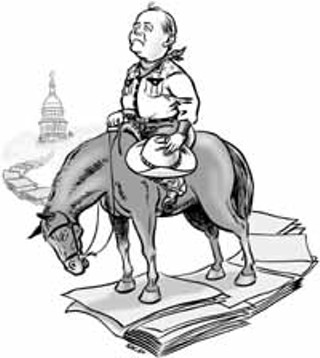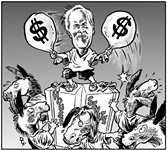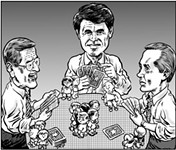Capitol Chronicle: A Profile in Courage
Glen Maxey, a man of honor, steps down
By Michael King, Fri., Dec. 7, 2001

By the time you read this, Glen Maxey, D-Austin, will have announced his retirement from the Texas House of Representatives.
After nearly 12 years and six sessions as the representative of Austin's District 51, Maxey has decided to call it quits. "I want to begin the next stage in the long process of discovering what my 82-year-old mother calls 'What I want to do when I grow up.'"
Maxey and I talked on Nov. 29, the day after a panel of federal judges confirmed in most details the redistricting map drawn earlier this year by the Republican-dominated Legislative Redistricting Board. Among many other partisan injuries inflicted by the new map, Maxey was drawn out of his own district. Though he could still run -- and as an incumbent, likely win in the new, more heavily Hispanic District 51 -- he has decided instead to do something else. Precisely what, he's not yet certain.
"I'm leaving for the right reasons," Maxey said. "I've spent most of my life trying to 'save the world,' beginning with teaching migrant school kids in Navasota, and now it's time to take care of me. The LRB just made for me a decision I needed to make anyway. I've never made much money, and this move is personal and financial: I need to get on with the rest of my life."
Maxey's decision was not unexpected, as he had spoken frankly during this year's Legislative session of possibly stepping down once he had earned his House member's retirement. Setting aside the political considerations of redistricting, the economics of legislative service are unforgiving and finally anti-democratic: Under the official state illusion of a "citizens' legislature," members receive $600 a month for what is a demanding and, during session, an overwhelming obligation. Those, like Maxey, without a considerable independent income or a compromising sinecure, must hustle during the interim to catch up. Now that he's earned his retirement, Maxey says he's weary of the race. "It's just impossible to have a career, unless you're already established in a profession. Many of my colleagues are in the insurance business, or they're lawyers, or they can hire people to run their businesses when they're at the Capitol." Maxey makes his living as an independent political consultant -- currently he's working on the Tony Sanchez campaign -- but it's an on-again, off-again income, and he needs something more stable.
"If I could do this forever," he says of legislating, "I would because I enjoy the process. ... I don't know what I'm going to do, but I'm sure it will be something connected to the Legislature. I can't sit on the dais in a committee meeting, and I can't cross the rail in the House -- but I'll be around, I'm sure, doing something connected to the process."
Outed by Dan Rather
Beyond his elective service, Maxey has been devoted to the process for more than 20 years. He was a Navasota schoolteacher in 1981 when he joined the successful House campaign of Kent Caperton. He was asked to join Caperton's staff as a legislative aide. The following year he lost his own race for an open House seat in College Station. Later he joined Jim Hightower's campaign for Agriculture Commissioner, and in November of 1982 the staff of legendary Democratic Sen. Oscar Mauzy.
Although in recent years Maxey has become a hero of gay activism in Texas, in the mid-Eighties he lived a life he would later describe as "extremely closeted." That ended abruptly, and not entirely by design, when he took up the cause of a Houston man with HIV, who had been threatened with quarantine by Texas health authorities.
As Maxey recalls the episode, "It was very early in the AIDS crisis, the disease wasn't very well understood, and the commissioner of health began talking about declaring HIV a 'quarantinable disease.' I was working with AIDS activists, and I went to Mauzy and asked him could we get involved. He answered, as he always did, 'Well, get something organized.' So we called committee hearings, and I contacted Dr. Mathilde Krim, at the time the foremost authority on AIDS and an advocate for patients. She came down here and testified against the quarantine."
The Board of Health backed down, and legislative aide Glen Maxey found himself on the steps of the Capitol being interviewed about the controversy by TV reporters. "The word was never mentioned, the question was never asked -- but on the CBS Evening News that night, the tagline said I was a 'Gay Activist.' Nobody else was working on AIDS at that time, so they just assumed it. That's how my mother and my relatives found out I was gay. I was outed before outing was cool, by Dan Rather."
Maxey said that night he realized his only alternative to acknowledging his real self would be outright dishonesty: to return to the closet with a vengeance. He couldn't do it. "I lost most of my job opportunities," he remembers, "but I became gay."
In a 1994 speech, Maxey recalled the remarkable transition from his fearful teenage years to his public prominence, now accustomed to wearing the designation of "the only openly gay Texas legislator." "I was extremely closeted. I was so scared that I contemplated taking my life," he said. "Now I'm probably one of the most visible homosexuals in the conservative state of Texas."
Maxey worked for Mauzy through 1986, emphasizing the public health issues that have become his legislative bread and butter, and in 1987 became the first executive director of the Lesbian/Gay Rights Lobby. In 1990, he joined the Ann Richards gubernatorial campaign. The night Richards won, campaign staffers were sitting around wondering what each might do next. "When they asked me," said Maxey, "I just blurted out what I was thinking. 'I want to run for the House,' I said."
'A Breath of Fresh Air'
Maxey had run before, but not as an openly gay candidate. His friends and party colleagues were not encouraging. They told him conservative opponents would single him out for personal abuse, with the not-quite-spoken warning that even in "liberal" Austin, he didn't have a chance of winning. He met with Gov. Richards, and although she was personally supportive, she said, "Don't do it. Even if you win, they'll never let you do what's important." A close friend, also a gay man, said, "It'll be awful -- but if you can do it and do good, nobody will care that you're gay."
Maxey ran and won, developing a reputation for personal campaigning. "I found I had to overcome liberal sentiment that said, 'Other things being equal, I'm voting for a minority candidate.' I pointed out that other things were not equal -- that black and Hispanic voters had representatives who spoke openly for them at the Capitol, but gay people had no one."
He entered the House with the additional disadvantage of having won a special election just before session, missing even the bonding ritual of freshman rep orientation. It was difficult, Maxey said, until a small and shrinking group of House progressives put together an initiative for ethics reform that the leadership fiercely opposed. "I was the only one willing to carry all the amendments against that opposition. When [Rep.] Paul Sadler saw I would do that, he told the others, 'Glen Maxey is doing the most important thing he could do for the gay community. People will remember it was the "gay guy" who stood up for what's right.'"
As expected, the bills were badly defeated, but Maxey gained a reputation for political courage. "God, you've got balls," said an awestruck colleague. "I told him, 'After you've told your small-town Texas family you're gay, this is easy.'" He recalls with pride one newspaper headline in the wake of his "defeat": "A breath of fresh air -- freshman Glen Maxey risks career for ethics reform." It was the first step toward real ethics reform in the Legislature.
'Absolutely Boring'
There was more personal antagonism, including legislators who wouldn't speak to him, be photographed in his presence, or who reflexively opposed any legislation with his name on it. But Maxey went out of his way to approach hostile colleagues and build voting coalitions. "'How can I help you?' I'd ask. That's a great way to win friends and allies."
His influence became crucial in the group that elected Pete Laney House Speaker and reformed the byzantine House rules. In subsequent years, he earned a reputation as one of the hardest-working and most effective House members -- and the only one with the perennial courage to sponsor an income-tax bill. "This session I sponsored and passed more bills than any other member," he said, "even while serving on Appropriations." Citing his work on care for disabled children, the children's insurance program, access to Medicaid, the fight against grandfathered pollution, reform of the TNRCC, and progressive changes in the House rules, he said, "These are an accumulation of incremental changes that over time can make a big difference in people's lives."
Summarizing his successful recent sessions and the change in attitude from his colleagues, Maxey laughs, "I have become absolutely boring." Maybe to a degree -- but he still ruffled feathers during the presidential campaign, when he revealed a House floor attempt by then-Gov. Bush to rationalize his public opposition to gay adoptions. Although Bush denies it, Maxey said Bush pulled him close, congratulated him on his fierce and successful advocacy for children's insurance, and then told him, "What I say publicly about gay people doesn't pertain to you." Maxey says he responded, "When you say a gay person isn't fit to be a parent, that's real personal."
Maxey believes that whoever is the next "openly gay legislator" won't have quite as tough a road as he had. And he remains optimistic about the prospects of progressive legislation, despite partisan redistricting and the likelihood of Republican domination of both houses. "In many ways, it's better now than it was when I came into the House. There were more Democrats then, but so many of them were old guard, actively hostile to any progressive change in Texas, and really hostile to gay people. Some of the current Republicans are easier to work with than they were."
With the state facing a growing fiscal crisis, will any of the new generation of legislators, Democratic or Republican, have Maxey's courage -- his balls -- to sponsor an income-tax bill?
Glen Maxey laughed -- but that question, even he couldn't answer. ![]()
Got something to say on the subject? Send a letter to the editor.








